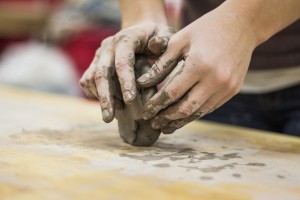Main Body
What’s Your Story?
Click play on the following audio player to listen along as you read this section.
Even though we tell stories every day at school, over the dinner table, and on the phone, being asked to write a story down on paper can feel overwhelming. We may suddenly feel that what we have to say is not interesting or important enough to share. But a story doesn’t have to be as dramatic as a Hollywood movie to be worth telling. Everyday life is full of valuable stories. Joe Lambert of the Center for Digital Storytelling identifies some common story types, as well as some questions that may help us find the story we want to tell.

Stories about someone important in your life
These stories may be about finding meaning in a relationship with a family member, friend, neighbour, or co-worker. The story may be a way to remember and honour someone who has passed away. It may be a story about romantic love.
- What is your relationship to this person?
- How would you describe this person?
- Was there an event that really shows what kind of person they are?
- What about the person do you enjoy most?
- What about the person drives you crazy?
- What lesson did you learn from the person that you feel is most important?
- If you had something to say to the person, but they never had a chance to hear it, what would that be?

Adventure stories
These are stories about our travels and what we realized along the way.
- What was challenging about the trip?
- What was the best part of the trip?
- How did the trip help you see your regular life in a new way?

Accomplishment stories
These are stories about achieving a goal, like getting a job or winning a sports game.
- What was the event?
- Where and when did the event happen?
- Who did you experience the event with?
- What moment stands out the most for you?
- How did you feel during the event?
- What did the event teach you?
- How did this event change your life?

Stories about a place in your life
These are stories about special places like a home, a town, a gathering place, a mountain, or a forest. These places can shape our values and sense of community.
- How would you describe the place?
- Who shared this place with you?
- What experiences happened here?
- Does one of these experiences stand out?
- What lessons about yourself can you draw from this place?
- If you have returned to this place, how has it changed?

Stories about what you do
These are stories about your job, hobby, or volunteer role.
- What is your job or hobby?
- What experiences prepared you for this activity?
- Was there an event that led you toward this interest?
- Who influenced you or helped you develop this interest?
- How has this job or hobby affected your life as a whole?
- What has been the best part of doing this job, hobby, or volunteer role?

Discovery stories
These are stories about learning. They might be about a first, an embarrassing moment, or a mistake.
- What was the event?
- Where and when did the event happen?
- Who did you experience the event with?
- What moment stands out the most for you?
- How did you feel during the event?
- What did the event teach you?
- How did the event change your life?
With all these possibilities, finding the right story to tell can be difficult. Lambert recommends the following activities to help you get started:
- Choose a story type from the list above. Write whatever comes to mind on that topic for 10 minutes without stopping.
- Choose a story type from the list above. Record yourself as you answer the list of questions for that story type. Listen to your recording and write down what you said.
- Choose a story type from the list above. Have someone ask you the questions for that topic. Record the conversation. Listen to it and write down what you said.
- Draw a map of the neighbourhood you grew up in. Include the layout of the streets, as well as where friends lived, friendly or strange neighbours, stores, school, and so on. What events did this process remind you of?
- Look around your house for images that are meaningful to you. Do any images relate to each other? What memories link those images together?
There is a seed of a story somewhere in the thoughts generated by these exercises. The key is to start with a small idea. Play with that small idea as though it’s a block of clay. Keep sculpting the details of your idea, looking at it from different angles until it starts to take on the rough shape of the story you want to tell.

Digital Story Spotlight
In 2012, 20 youth in the Native Youth Enrichment Program at the University of Washington participated in a digital storytelling workshop. Taté BlackBear, a Lakota teenager, was one of the participants. The American and Canadian governments tried to erase Aboriginal languages and cultures for over 100 years, so the Lakota have had to work very hard to keep their language alive. There are about 6,000 people who can speak the Lakota language. Taté knew six words in his traditional language.
As you watch, think about what category his story falls into. Think of the reasons behind your decision.
Watch 7th Word.
Media Attributions
- bride-428105_1280 © Takmeomeo is licensed under a Public Domain license
- hiking-691738_1280 © Unsplash is licensed under a Public Domain license
- gold-medal-winner-381749_1280 © skeeze is licensed under a Public Domain license
- home-671148_1280 © PIX1961 is licensed under a Public Domain license
- construction-703807_1280 © skeeze is licensed under a Public Domain license
- magnifying-glass-671858_1280 © johnsatwork is licensed under a Public Domain license
- clay-690404_1280 © Unsplash is licensed under a Public Domain license
So confusing or difficult you feel like you can't do it
Something that greatly affects people's emotions
Very useful, helpful, or important
The act of saying who or what something is
Succeeding at something by working hard
Changed or affected by someone or something
Produced or caused something
Producing good effects on the body or mind
A person who is involved in an activity
A group of people or things that are similar in some way

